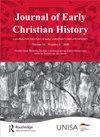The Shifting Roles of Wealth and Poverty in Jerome's Vision of Asceticism and the Call to Perfection, as Reflected in a Selection of His Works
IF 0.1
0 RELIGION
引用次数: 0
Abstract
ABSTRACT This study considers the place of financial renunciation, voluntary poverty and almsgiving in Jerome's ascetic vision, and reveals a delicate balancing act in his advice to wealthy Christians contained in a selection of his letters and treatises. I will investigate the practical realisation of his vision by Jerome and his followers within the social, political and legal context of the late fourth and early fifth centuries CE. Scriptural injunctions mainly informed early Christians’ understanding of wealth and poverty. I interrogate Jerome's response to the teachings of Jesus in connection with care for the poor: Who was to benefit from almsgiving—the donor or the recipient? Was there a self-interested dimension in financial renunciation and almsgiving? Was Jerome consistent in his advice to those who embraced financial asceticism? The dominical command to perfection was the cornerstone of Jerome's ascetic exhortations. Special attention will be given to Jesus Christ's advice to the rich young man (Matt. 19:16–30, with parallels in Mark 10:17–31 and Luke 18:18–30). Finn and Dunn, respectively, have investigated Jerome's references to this passage. However, Jerome's interpretation of this dominical command and the “call to perfection” deserves attention. What did Jerome consider to be “the attainment of perfection,” was he consistent in his advice, and were there any underlying motivations in his encouragement of dispossession by wealthy Christian ascetics? This article seeks to answer these questions through a study of a selection of Jerome's works, addressed to different persons according to varying rhetorical strategies and with different purposes in mind.从杰罗姆作品选集看财富与贫穷在其Asceticism视野中的角色转换与对完美的呼唤
摘要本研究考虑了经济放弃、自愿贫困和施舍在杰罗姆禁欲主义视野中的地位,并揭示了他在精选的信件和论文中对富有基督徒的建议中的微妙平衡行为。我将调查Jerome和他的追随者在公元四世纪末和五世纪初的社会、政治和法律背景下对他的愿景的实际实现。圣经中的禁令主要影响了早期基督徒对财富和贫困的理解。我质疑杰罗姆对耶稣关于照顾穷人的教导的回应:谁会从施舍中受益——捐赠者还是接受者?放弃经济和施舍是否有利己主义的一面?Jerome对那些信奉金融禁欲主义的人的建议是一致的吗?对完美的支配命令是杰罗姆禁欲主义规劝的基石。将特别注意耶稣基督对富有年轻人的建议(马太福音19:16–30,与马可福音10:17–31和路加福音18:18–30相似)。Finn和Dunn分别调查了Jerome对这段话的引用。然而,杰罗姆对这种支配性命令和“对完美的呼唤”的解释值得关注。Jerome认为什么是“达到完美”,他的建议是否一致,他鼓励富有的基督教苦行僧剥夺财产是否有任何潜在动机?本文试图通过对杰罗姆作品的研究来回答这些问题,这些作品根据不同的修辞策略和不同的目的面向不同的人。
本文章由计算机程序翻译,如有差异,请以英文原文为准。
求助全文
约1分钟内获得全文
求助全文

 求助内容:
求助内容: 应助结果提醒方式:
应助结果提醒方式:


